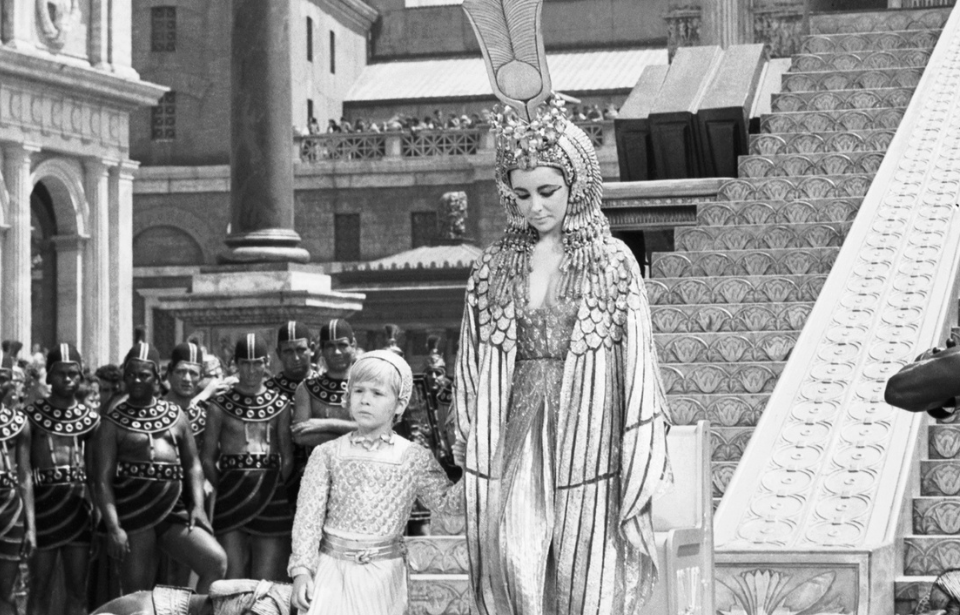While many people remember the legendary meeting and history of Cleopatra and Julius Caesar, many forget that the two shared a son. Named Caesarion, he married his mother, was a co-ruler with her, and was even accepted by his step-father, Mark Antony. A full but short life, their son’s story has been eclipsed by their own.
Cleopatra’s rise to pharaoh
Cleopatra VII was the last true pharaoh of the Ptolemy line. The Ptolemy pharaohs were of Macedonian descent and rulers of that line had sat on the throne in Egypt for three hundred years. Cleopatra is and was most famous for her beauty and skills of seduction, but people often seem to forget that, first and foremost, she was a ruler. She first came to the throne at a young age and in troubled times, and used every skill she had to try to protect her people. One of those skills was cultivating the attention and support of powerful men.
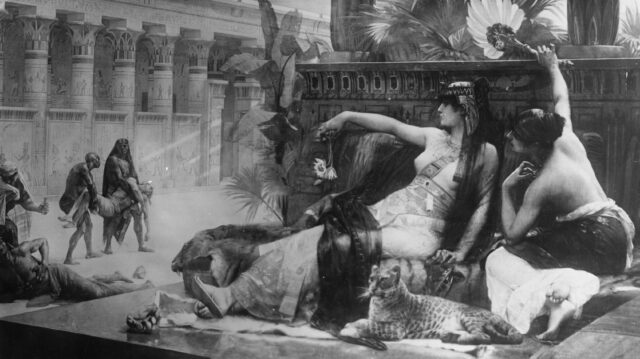
Cleopatra was born in 70 or 69 BC, according to History, the daughter of Ptolemy XII and his wife (and maybe half-sister). When she was 18 years old, her father died and the throne became hers. Since women couldn’t rule alone in Egypt, she married her 10-year-old brother, Ptolemy XIII, to serve as her co-ruler.
Meeting Julius Caesar
Not long after their rule began, Ptolemy XIII’s advisors acted against her and she fled to Syria in 49BC. She spent a year in Syria raising an army of mercenaries then returned to Egypt to challenge her brother’s forces at the Eastern edge of the country.
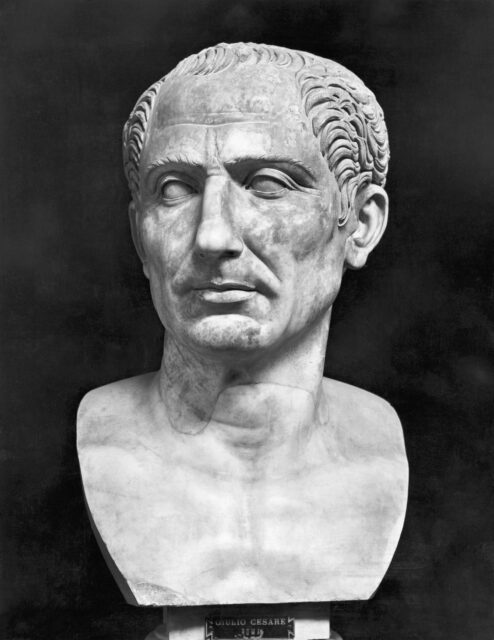
This is the time that Julius Caesar enters Cleopatra’s story. When Caesar marched on Rome to confront Pompey’s armies during the Great Roman Civil War, Pompey fled to Greece but was defeated there by Caesar’s forces in the Battle of Pharsalus in 48BC. Pompey managed to escape the battle and went to Egypt hoping to find support. News of the battle had traveled ahead of him, though, and the Egyptians – who took his loss as a sign that the gods favored Caesar over him – promptly killed him.
Caesar chased Pompey to Egypt, and upon arrival, was presented with Pompey’s head. Caesar announced his outrage and the focus of ire was Ptolemy XIII. Cleopatra was not against using the situation to her advantage. She arranged a meeting with Caesar, spurring the famous story about her being delivered to him in a rolled-up carpet, although some authorities believe that she was just veiled, which may be more reasonable.
The pair had a son they named Caesarion
Whether it was her lineage as a descendant of Alexander the Great, or her personal qualities, Cleopatra and Caesar become lovers in short order. Caesar stepped back from his position around Pompey’s death, and Cleopatra was reinstated as co-ruler with Ptolemy XIII. Unfortunately, Ptolemy wasn’t happy about this, and a fight ensued. Ultimately, Ptolemy’s forces lost, and he was drowned during the battle, leaving Cleopatra alive and pregnant with Caesar’s child.
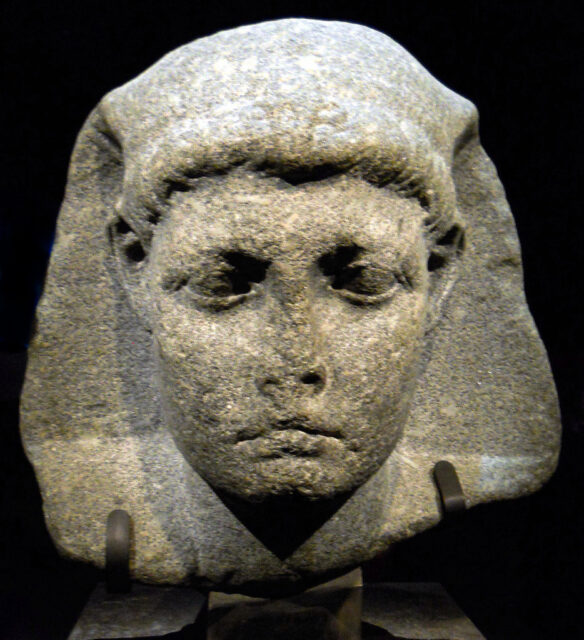
Caesar established her younger brother, Ptolemy XIV, as her co-ruler and then married her himself in the Egyptian fashion (the marriage wasn’t acknowledged in Rome, as he was already married, and it was illegal for him to marry a foreigner.) Not long after that, Caesar returned to Rome.
Cleopatra wasn’t very popular in Alexandria and relied on Roman legions for her protection. After about a year, she and the son she bore Caesar, known as Caesarion, left Egypt to go to Rome. It’s unclear whether Caesar and Cleopatra resumed their affair while she was in Rome, but it is known that Caesar never denied his son’s paternity. Of all of Caesar’s children (he had three in total), Caesarion was his only son. When Caesar was assassinated in 44 BC, Cleopatra and Caesarion returned to Egypt.
Life after Caesar
Caesarion was made Cleopatra’s co-ruler in 44 BC after the death of her co-ruler/brother/husband Ptolemy XIV and remained so until her death in 30 BC. There were rumors that Cleopatra had poisoned her brother so she could put Caesarion on the throne, but this has never been verified. Regardless, her reign was pretty stable for the next fourteen years, as she had gained the support of one of the new Roman leaders, Mark Antony.
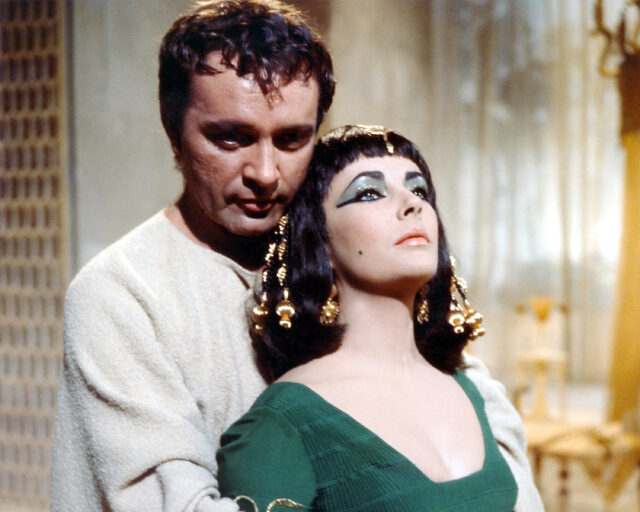
They eventually married and had three children, despite Antony having already married Octavia, the sister of his political rival Octavian, as a way of consolidating his power base in Rome. In 34 BC, Antony held the Donations of Alexandria, in which he “donated” a number of Roman territories to his Egyptian family. During the ceremony, Caesarion was named “King of Kings,” and his mother was named “Queen of Kings.” Antony also named Caesarion, officially, as the son of Julius Caesar.
Octavian was made quite angry by these acts, and began to stir up dissent in Rome, saying that Cleopatra was corrupting and manipulating Antony so he would make her queen of Rome. The Senate of Rome declared war on Cleopatra in 32 BC, using her influence over Antony and supposed anti-Roman agenda as justification. Cleopatra and Antony were slowly losing the war with Rome when Caesarion was coming of age.
By 30 BC, Octavian invaded Egypt and Antony fought several losing battles against him. Cleopatra, afraid for Caesarion’s life, made plans to send him away with wealth to live comfortably. On the day that Octavian captured the city of Alexandria, Antony fell on his sword. A few days later, Cleopatra ended her own life to avoid being taken to Rome as part of Octavian’s triumph.
Read another story from us: How to Make Someone Desire You? Ancient Egyptian “Love Spell” Decoded
Although Caesarion was technically the sole ruler in Egypt until his capture and death a couple of weeks after his mother’s suicide, it really was Cleopatra’s death that marked the end of the rule of Pharaohs.
